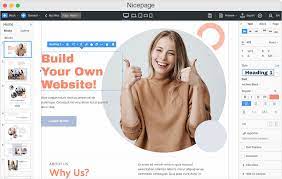Unlocking Success: The Power of Your Professional Website
The Importance of Having a Professional Website
In today’s digital age, having a professional website is essential for any business or individual looking to establish a strong online presence. A website serves as your virtual storefront, providing potential customers or visitors with information about your products, services, and brand identity.
One of the key benefits of having a professional website is credibility. A well-designed and informative website can instill trust in your audience and showcase your professionalism. It can help you stand out from competitors who may not have an online presence or have outdated websites.
Another advantage of having a website is accessibility. With a website, you can reach a global audience 24/7, allowing potential customers to learn about your offerings at any time. This accessibility can lead to increased visibility and opportunities for growth.
Furthermore, a professional website can enhance your marketing efforts. By incorporating SEO strategies, engaging content, and clear calls-to-action on your site, you can attract more traffic and convert visitors into customers. Your website can also serve as a hub for your social media and email marketing campaigns.
Overall, investing in a professional website is crucial for establishing credibility, increasing accessibility, and enhancing marketing efforts in today’s digital landscape. Whether you’re a small business owner, freelancer, or creative professional, having a well-designed website can make all the difference in reaching your target audience and achieving success online.
Top 6 Frequently Asked Questions About Websites
- What is the purpose of a website?
- How much does it cost to build a website?
- What are the key elements of a successful website?
- How can I improve the visibility of my website on search engines?
- Do I need a mobile-responsive design for my website?
- How can I measure the performance and success of my website?
What is the purpose of a website?
The purpose of a website is multifaceted, serving as a digital gateway that connects businesses, individuals, and organisations with their target audience. A website acts as a virtual storefront, providing vital information about products, services, and brand identity to potential customers. It serves as a platform for showcasing expertise, building credibility, and establishing trust with visitors. Additionally, a website enhances accessibility by enabling businesses to reach a global audience 24/7. Ultimately, the primary goal of a website is to engage users, drive conversions, and support the overall objectives of the entity it represents.
How much does it cost to build a website?
One of the most frequently asked questions when it comes to building a website is, “How much does it cost?” The answer to this question can vary widely depending on various factors such as the complexity of the site, the features and functionalities required, design elements, and whether you choose to hire a professional web developer or use DIY website builders. It’s important to consider your specific needs and budget when determining the cost of building a website, as there are options available for every price range. By researching different options and getting quotes from web developers, you can find a solution that meets your requirements while staying within your budget.
What are the key elements of a successful website?
When considering the key elements of a successful website, several factors come into play. Firstly, a visually appealing and user-friendly design is crucial to capture visitors’ attention and provide a seamless browsing experience. Clear navigation, intuitive layout, and responsive design are essential components. Secondly, engaging and relevant content that resonates with the target audience is vital for keeping visitors interested and informed about your products or services. Additionally, strong branding elements such as a memorable logo, consistent colour scheme, and compelling imagery help reinforce your brand identity. Lastly, incorporating effective SEO strategies, fast loading times, secure payment options (if applicable), and regular updates to keep content fresh are all important aspects that contribute to the success of a website in attracting and retaining visitors.
How can I improve the visibility of my website on search engines?
Improving the visibility of your website on search engines is crucial for attracting organic traffic and reaching a wider audience. To enhance your website’s search engine visibility, consider implementing effective SEO strategies such as optimizing your website’s content with relevant keywords, creating high-quality backlinks from reputable sites, improving site speed and mobile-friendliness, and regularly updating your content to keep it fresh and engaging. By focusing on these key aspects of SEO, you can increase your website’s chances of ranking higher in search engine results pages and ultimately drive more traffic to your site.
Do I need a mobile-responsive design for my website?
In today’s mobile-centric world, having a mobile-responsive design for your website is crucial. With the increasing number of users accessing websites on smartphones and tablets, ensuring that your site is optimised for mobile devices is essential for providing a seamless user experience. A mobile-responsive design adapts to different screen sizes and resolutions, ensuring that your content remains easily accessible and visually appealing across all devices. By investing in a mobile-responsive design, you can enhance user engagement, improve search engine rankings, and ultimately reach a wider audience effectively.
How can I measure the performance and success of my website?
Measuring the performance and success of your website is crucial for understanding its effectiveness in reaching your goals. There are several key metrics you can track to evaluate your website’s performance, such as website traffic, bounce rate, conversion rate, and average session duration. By analysing these metrics using tools like Google Analytics, you can gain valuable insights into how users interact with your site, identify areas for improvement, and make data-driven decisions to enhance its overall performance. Regularly monitoring and adjusting your website based on these metrics will help you optimise its success and achieve your desired outcomes.
